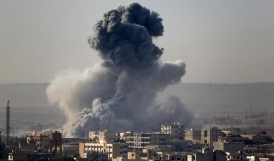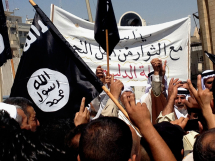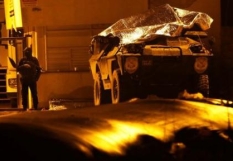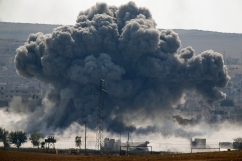Islamic State militants have detained and tortured Kurdish children, Human Rights Watch (HRW) has confirmed.
Stories from four teenage boys who were released in September reveal repeated beatings, intense "religious instruction" and forced viewings of brutal violence and beheadings.
"Those who didn't conform to the program were beaten. They beat us with a green hose or a thick cable with wire running through it. They also beat the soles of our feet," one 16-year-old recalled.
"I was once put inside the tire and beaten. They sometimes found excuses to beat us for no reason...They made us learn verses of the Quran and beat those who didn't manage to learn them. When some boys tried to escape, the treatment got worse and we were all punished and given less food."
The boys were part of a group of around 250 children from Kobani who were taken by ISIS on May 29 this year. They were travelling home after having taken school exams in Aleppo.
All of the girls, numbering around 100, were released several hours later. The boys were kept at a school in Manbij, about 30 miles southwest of their hometown.
Some managed to escape and the rest were gradually released or traded for ISIS fighters. The last 25 were freed on October 29.
Now seeking protection in Turkey, the boys report that those with relatives in Kurdish armed group the People's Protection Units (YPG) received particularly harsh treatment during detention.
"It was really those whose families were close to the YPG who suffered most," one 15-year-old said.
"They [ISIS militants] told them to give them the addresses of their families, cousins, uncles, saying 'When we go to Kobani we will get them and cut them up.' They saw the YPG as kafir [unbelievers]."
He added that electric cables were sometimes used in beatings, and described one punishment during which a child was strung up with his hands and one of his feet tied behind his back.
Special advisor for children's rights at HRW, Fred Abrahams, explained that young people in Syria are particularly vulnerable.
"Since the beginning of the Syrian uprising, children have suffered the horrors of detention and torture, first by the Assad government and now by ISIS," he said.
"This evidence of torture and abuse of children by ISIS underlines why no one should support their criminal enterprise."
Though the boys are now free, ISIS, which is attempting to create a caliphate across a northern stretch of Iraq and Syria, has since taken more hostages. A number of children and adults from villages near Kobani are currently being held.
Both taking hostages and administering torture are war crimes under international humanitarian law.
"Governments in the Middle East and the West should swiftly implement the UN Security Council resolutions aimed at curbing support for ISIS. To stem ISIS abuses, governments need to tackle its fundraising and recruitment," Abrahams said.
Kobani is now seen by many as a symbolic test of the US-led coalition's ability to halt the advance of Islamic State, which has poured weapons and fighters into its assault of the town that has lasted more than a month.
The battle has deflected attention from significant gains elsewhere in Syria by Islamic State, which has seized two gas fields within a week from President Bashar al-Assad's forces in the center of the country.
Weeks of fighting have taken place within full view of the Turkish border, causing outrage among Kurds in Turkey who blamed their government for doing too little to help defend the town.
The arrival in Kobani of the Iraqi Kurdish peshmerga and additional Syrian Free Syrian Army (FSA) fighters in recent days has escalated efforts to defend the town after weeks of US-led air strikes slowed but did not reverse the Islamists' advance.
White smoke billowed into the sky as peshmerga and FSA fighters appeared to combine forces, raining cannon and mortar fire down on Islamic State positions to the west of Kobani, a Reuters witness said.
The US military said it bombed Islamic State positions in Syria five times and in Iraq nine times on Sunday and Monday, including near Kobani.
An estimated 150 Iraqi Kurdish fighters crossed into Kobani with arms and ammunition from Turkey late on Friday, the first time Ankara has allowed reinforcements to reach the town.
"(Their) heavy weapons have been a key reinforcement for us. At the moment they're mostly fighting on the western front, there's also FSA there too," said Meryem Kobane, a commander with the YPG, the main Syrian Kurdish armed group in Kobani.
She said fierce fighting was also continuing in eastern and southern parts of the city.
The peshmerga, the official security forces of Iraq's autonomous Kurdish region, have deployed behind Syrian Kurdish forces and are supporting them with artillery and mortar fire, according to Ersin Caksu, a journalist inside Kobani. The fiercest fighting was taking place in the south and east, areas where the reinforcements were not deployed, he said.
Despite weeks of air strikes, Islamic State has continued to inflict heavy losses on Kobani's defenders. Late last week hospital sources in Turkey reported a jump in the number of dead and wounded Kurdish fighters being brought across the frontier.
(Additional reporting from Reuters)


















